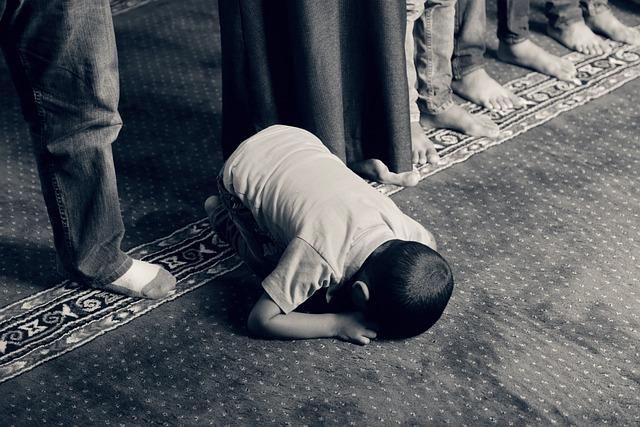Introduction: WomenŌĆÖs Lives under Islamic State in NigerŌĆÖs Tillabery – Crisis Group
In the arid expanse of NigerŌĆÖs Tillabery region, the specter of violence and extremism looms large, reshaping the lives of women in profound and often devastating ways. Under the emergence of the Islamic State (IS) and its affiliates, womenŌĆÖs roles within their communities are being distorted and constrained amidst a backdrop of fear and instability. The Crisis GroupŌĆÖs latest report sheds light on the unique challenges faced by women in this volatile landscape, where customary norms clash with the harsh impositions of militant ideology. As the situation in Tillabery evolves, understanding the lived experiences of women offers critical insights into the broader humanitarian crisis and underscores the urgent need for targeted interventions that prioritize their rights, safety, and empowerment. This article delves into the findings of the Crisis Group, exploring the multifaceted impacts of IS violence on women’s lives, their resilience in the face of adversity, and the pressing need for inclusive strategies in efforts to restore peace and stability in a region under siege.
Impact of Islamic State on WomenŌĆÖs Daily Lives in Tillabery
The presence of the Islamic State in Tillabery has drastically altered the landscape of daily life for women in the region. With the imposition of strict interpretations of Sharia law, women face numerous restrictions that stifle their freedoms and redefine their roles within both the household and society at large. Key impacts include:
- Limitations on Movement: Women often need male approval to travel, restricting their ability to engage in economic activities or attend educational institutions.
- Economic Hardships: Many women, who were previously breadwinners, have seen their livelihoods jeopardized as market engagements are curtailed.
- Increased Violence: Reports of domestic violence have surged, as extremist ideologies further normalize the oppression of women.
In addition,access to healthcare and education is severely compromised. Schools, especially for girls, often face closure or are repurposed for military use by insurgents. This leads to a significant decline in literacy and education levels among young girls, perpetuating a cycle of poverty and dependency. The consequences are particularly dire:
| Impact Area | Current Status |
|---|---|
| Education | Severe restrictions on girlsŌĆÖ enrollment and attendance |
| Health Services | Limited access, resulting in higher maternal and infant mortality rates |
| Employment | Widespread job losses and increased reliance on male family members |

Violence and Coercion: The Threat to WomenŌĆÖs Safety and Freedom
The environment in Niger’s Tillabery region has become increasingly perilous for women, largely influenced by the presence of extremist groups like the Islamic State. The manipulation of socio-economic vulnerabilities has resulted in widespread violence and coercion, severely undermining women’s safety and freedom. Traditional gender roles have been not only reinforced but weaponized,leading to a hierarchy that prioritizes male dominance over the autonomy of women. The threat manifests through various forms, including:
- Targeted violence: Women are often subjected to brutal attacks as a means of instilling fear within communities.
- Forced marriages: Families may feel compelled to marry off their daughters as a strategy for protection or to advance alliances.
- Restricted mobility: Women frequently face limitations on their freedom to move about, impeding their access to education and essential services.
The coercive tactics employed by these groups foster an atmosphere where women’s rights are increasingly jeopardized. In an effort to reclaim control, many women are organizing silently, yet effectively, often creating networks to support one another in navigating the treacherous landscape. Initiatives tend to focus on:
- Community solidarity: Women unite to share resources and provide emotional support.
- Education initiatives: Efforts to promote female literacy and vocational training are gradually taking root.
- Advocacy for rights: grassroots organizations are emerging to challenge oppressive norms and advocate for legal protections.

Healthcare Disruptions: WomenŌĆÖs Access to Medical Services
Women in the Tillabery region of Niger are facing significant hurdles in accessing essential healthcare services due to ongoing instability and the influence of extremist ideologies. Under the shadow of the Islamic State, traditional healthcare systems have become unreliable, with medical facilities often targeted or rendered inoperative. As a result, women are disproportionately affected, leading to dire consequences for maternal and reproductive health. The fear of violence has forced many healthcare providers to abandon their posts, and those who remain frequently enough struggle with the inadequate resources needed to meet the demands of their communities. In this context,securing medical consultations,routine check-ups,and emergency care has become a perilous endeavor for many women.
Moreover, cultural and social barriers further complicate women’s healthcare access. Many women experience stigma when seeking health services, compounded by the rising influence of radical ideologies that promote restrictive interpretations of gender roles. These factors lead to a decline in preventive care and health education, which are crucial for empowering women in making informed decisions about their health. To illustrate the dire situation, consider the following challenges faced:
- Lack of mobility: Fear of violence restricts travel to healthcare facilities.
- Healthcare worker shortages: Clinics often operate with minimal staff, if at all.
- Limited maternal care: High rates of maternal mortality due to inadequate prenatal and postnatal services.
| Challenge | Impact on Women |
|---|---|
| lack of Emergency Services | Delayed treatment for life-threatening conditions |
| Fear of Stigmatization | Reluctance to seek necessary healthcare |
| Inaccessibility of Information | Limited awareness of rights and health resources |

Education Under Siege: The Future of Girls in Conflict Zones
The harsh realities faced by girls in conflict zones, particularly under extremist regimes like the Islamic State in NigerŌĆÖs Tillabery, paint a grim picture for the future of female education. The ongoing violence and instability severely limit access to schooling, compounding the challenges of poverty and traditional gender roles. Many families, fearing for their daughters’ safety, often prioritize immediate survival over long-term educational investments. As an inevitable result, educational institutions have become targets, leading to closures and a significant decline in female enrollment rates. This environment generates a cycle where girls are deprived of the fundamental right to education, which is critical for their empowerment and the well-being of their communities.
The impact of this educational crisis extends beyond individual girls, affecting entire societies and future generations. When girls are unable to access education,the broader implications include increased rates of early marriage and limited economic opportunities. To illustrate these challenges, consider the following factors influencing girlsŌĆÖ education in conflict zones:
- Insecurity: Armed groups often target schools, leading to fear and reluctance among families to send their daughters.
- Displacement: Many communities are uprooted, disrupting education for children, especially girls.
- Gender Norms: Societal attitudes may discourage families from investing in girls’ education.
The situation exemplifies the urgent need for intervention and support. Humanitarian organizations play a pivotal role in restoring access to education for girls in these regions. by implementing protected learning spaces, providing resources, and promoting community awareness, we can begin to pave the way for a future where girls are no longer sidelined by conflict.The following table highlights some critical initiatives currently being undertaken:
| Initiative | Objective |
|---|---|
| Safe Learning Environments | Establish secure locations for education free from violence. |
| Community Education Programs | Engage families in promoting the value of girls’ education. |
| psychosocial Support | Provide mental health resources for trauma-affected youth. |

Resilience and Resistance: WomenŌĆÖs Role in Community Survival
In the face of adversity, women in Niger’s Tillabery region have emerged as pivotal figures in sustaining their communities through a series of trials posed by the Islamic State’s encroachment. Their resilience not only enables them to navigate the complexities of daily life under threat but also fosters a sense of solidarity among women and their families. Their contributions manifest in various forms, including:
- Economic Support: women have spearheaded local markets, ensuring the availability of essential goods despite increasing restrictions and violence.
- Education and Knowledge Sharing: By prioritizing the education of their children, they continue to instill hope and skills that are vital for future recovery.
- Advocacy and Leadership: Many women have taken on leadership roles within their communities, rallying support for one another and advocating for their rights amidst oppressive circumstances.
Moreover, these women have developed strategies that not only resist the destabilizing forces of the Islamic State but also reinforce community bonds. By fostering safe spaces, they have created networks that offer emotional and psychological support, essential for coping with trauma. key strategies include:
- Community Gatherings: Regular meetings provide a platform for discussing concerns, sharing resources, and maintaining a collective spirit.
- Sharing of Resources: Women frequently enough pool their resources to ensure food security and mutual assistance, thereby creating a safety net for the moast vulnerable.
- Organized Advocacy: Collaborating with NGOs and local organizations, they have begun to vocalize their needs and rights, demanding attention on the national and international stage.

Policy Recommendations for supporting Women in crisis Situations
To effectively address the numerous challenges faced by women in crisis situations, especially in regions like Niger’s Tillabery, targeted policy interventions are crucial. First and foremost, capacity-building programs should be established that focus on empowering women through education and vocational training. By facilitating access to resources that promote literacy and job skills,women can gain financial independence and greater agency within their communities. Additionally, psychosocial support services must be integrated into humanitarian responses to address trauma and mental health issues stemming from violence and displacement.This will help women rebuild their lives and foster resilience in a perpetually unstable environment.
Moreover, governments and NGOs should prioritize the inclusion of women in decision-making processes, particularly in conflict resolution and peacebuilding initiatives. This can be achieved by implementing policies that ensure women’s representation in local governance and peace negotiations. Cross-sector collaborations should also be encouraged to create comprehensive support systems that address issues such as healthcare,security,and legal aid for women facing violence and discrimination. The following table summarizes proposed actions and their intended impacts:
| Proposed Actions | Intended Impact |
|---|---|
| Capacity-building programs | Empower women through education and vocational training |
| Psychosocial support services | Address trauma and promote mental health |
| Inclusion in decision-making | Ensure womenŌĆÖs voices are heard in governance |
| Cross-sector collaborations | Create comprehensive support systems for women |

Concluding Remarks
the lives of women in Niger’s Tillabery region under the control of the Islamic State present a staggering reality marked by repression, vulnerability, and resilience. As extremist ideologies seek to undermine their rights and freedoms, women face systemic violence, restriction of mobility, and limited access to education and healthcare. However, amid these daunting challenges, many have demonstrated remarkable courage and resourcefulness, actively seeking ways to navigate, resist, and advocate for their rights. The international community’s attention and proactive engagement are crucial in addressing the multifaceted crises impacting women’s lives. As we reflect on the situation in Tillabery, it is imperative to amplify women’s voices, support local initiatives, and demand accountability for human rights violations. Only through a comprehensive understanding of their experiences can we hope to foster a path towards a more equitable and secure future for all women in conflict-affected regions.







